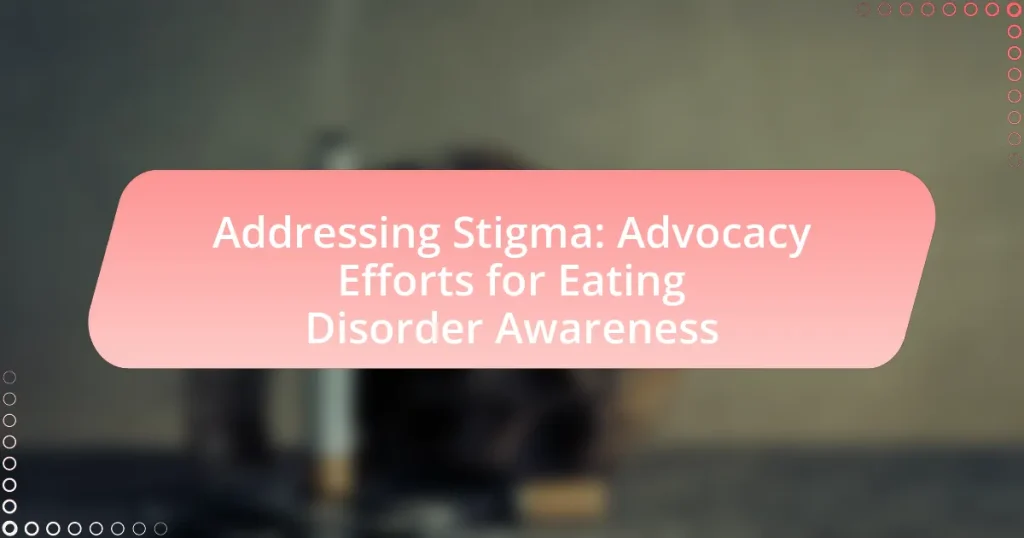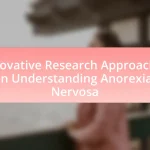The article focuses on the stigma associated with eating disorders and the advocacy efforts aimed at raising awareness and reducing this stigma. It outlines how societal attitudes contribute to discrimination, shame, and isolation among individuals suffering from eating disorders, ultimately hindering their willingness to seek help. Key topics include the psychological impacts of stigma, the importance of addressing it for effective recovery, and various advocacy strategies such as public awareness campaigns, educational programs, and community engagement. The article emphasizes the role of personal narratives and collaboration among organizations in fostering a supportive environment for those affected by eating disorders.
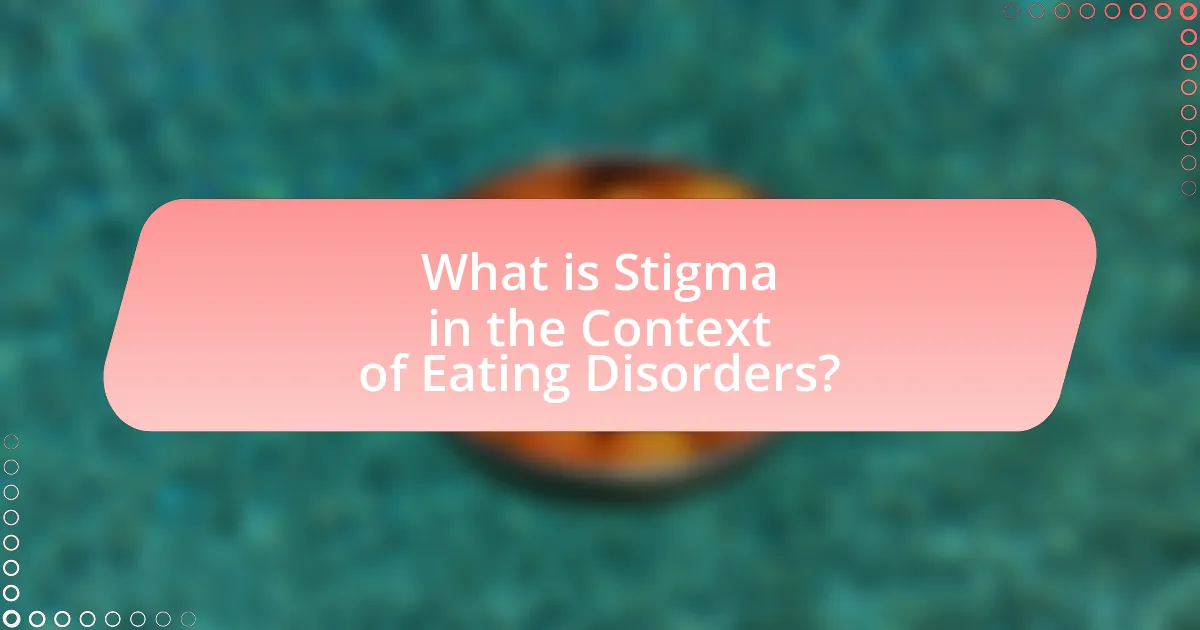
What is Stigma in the Context of Eating Disorders?
Stigma in the context of eating disorders refers to the negative attitudes and beliefs that society holds towards individuals suffering from these conditions. This stigma can manifest as discrimination, social exclusion, and a lack of understanding, which often leads to feelings of shame and isolation among those affected. Research indicates that stigma can significantly hinder recovery, as individuals may avoid seeking help due to fear of judgment or misunderstanding from others. For instance, a study published in the International Journal of Eating Disorders found that stigma is a barrier to treatment, with many individuals citing concerns about being labeled or judged as a reason for not pursuing care.
How does stigma affect individuals with eating disorders?
Stigma significantly impacts individuals with eating disorders by exacerbating feelings of shame and isolation. This negative perception can lead to reluctance in seeking help, as individuals may fear judgment or discrimination from others. Research indicates that stigma contributes to a cycle of worsening mental health, as individuals internalize negative societal attitudes, which can hinder recovery efforts. For instance, a study published in the International Journal of Eating Disorders found that individuals with eating disorders who experience stigma are less likely to engage in treatment and more likely to experience severe symptoms.
What are the psychological impacts of stigma on those affected?
The psychological impacts of stigma on those affected by eating disorders include increased feelings of shame, isolation, and low self-esteem. Individuals facing stigma often experience heightened anxiety and depression, which can exacerbate their eating disorder symptoms. Research indicates that stigma can lead to avoidance of treatment, as individuals may fear judgment from healthcare providers or society, further entrenching their condition. A study published in the journal “Eating Disorders” found that individuals with eating disorders who perceived high levels of stigma reported significantly worse mental health outcomes, highlighting the detrimental effects of societal attitudes on their psychological well-being.
How does stigma influence the willingness to seek help?
Stigma significantly reduces the willingness to seek help for eating disorders. Individuals often fear judgment or discrimination, leading to feelings of shame and isolation, which can deter them from accessing necessary support. Research indicates that 60% of individuals with eating disorders do not seek treatment due to stigma-related concerns, highlighting the profound impact stigma has on mental health help-seeking behavior.
Why is addressing stigma important for eating disorder awareness?
Addressing stigma is crucial for eating disorder awareness because it directly impacts individuals’ willingness to seek help and support. Stigmatization often leads to feelings of shame and isolation, which can exacerbate the severity of eating disorders. Research indicates that approximately 70% of individuals with eating disorders do not receive treatment, largely due to the fear of being judged or misunderstood. By reducing stigma, advocacy efforts can create a more supportive environment that encourages open discussions about eating disorders, ultimately leading to increased awareness, understanding, and access to necessary resources for those affected.
What role does stigma play in the prevalence of eating disorders?
Stigma significantly contributes to the prevalence of eating disorders by creating barriers to treatment and fostering feelings of shame among individuals affected. Research indicates that societal attitudes towards body image and mental health can discourage individuals from seeking help, leading to a higher incidence of untreated eating disorders. For instance, a study published in the International Journal of Eating Disorders found that individuals who experience stigma are less likely to disclose their struggles and seek professional support, which exacerbates the severity of their conditions. This cycle of stigma and avoidance perpetuates the prevalence of eating disorders in society.
How can reducing stigma improve recovery outcomes?
Reducing stigma can significantly improve recovery outcomes by fostering a supportive environment that encourages individuals to seek help. When stigma is diminished, individuals with eating disorders are more likely to access treatment, as they feel less fear of judgment or discrimination. Research indicates that stigma can lead to feelings of shame and isolation, which are barriers to recovery; for instance, a study published in the journal “Eating Disorders” found that individuals who perceive less stigma are more likely to engage in treatment and adhere to recovery plans. Therefore, reducing stigma not only promotes help-seeking behavior but also enhances the overall effectiveness of recovery efforts.
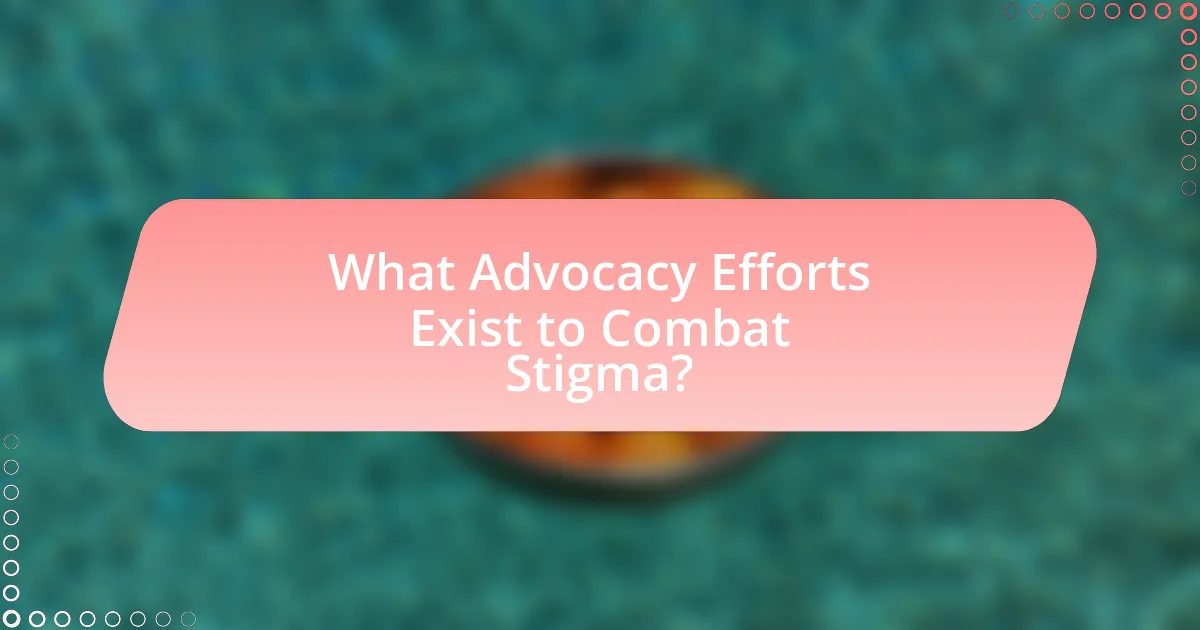
What Advocacy Efforts Exist to Combat Stigma?
Advocacy efforts to combat stigma surrounding eating disorders include public awareness campaigns, educational programs, and support groups. Organizations such as the National Eating Disorders Association (NEDA) conduct campaigns like National Eating Disorders Awareness Week, which aims to educate the public about the realities of eating disorders and reduce misconceptions. Additionally, educational programs in schools and communities provide information on body positivity and mental health, fostering a more supportive environment. Support groups offer individuals a safe space to share experiences and challenge stigma collectively, promoting understanding and empathy. These efforts are crucial in changing societal perceptions and encouraging individuals to seek help without fear of judgment.
How are organizations raising awareness about eating disorders?
Organizations are raising awareness about eating disorders through educational campaigns, social media outreach, and community events. For instance, the National Eating Disorders Association (NEDA) conducts annual awareness weeks that include webinars, social media challenges, and resource distribution to inform the public about the signs and symptoms of eating disorders. Additionally, organizations like Beat in the UK utilize social media platforms to share personal stories and expert insights, effectively reaching a broader audience. Research indicates that such initiatives can significantly reduce stigma and encourage individuals to seek help, as evidenced by a 2021 study published in the Journal of Eating Disorders, which found that awareness campaigns led to a 30% increase in help-seeking behavior among affected individuals.
What campaigns have been successful in changing perceptions?
The “NEDA Awareness Week” campaign has been successful in changing perceptions about eating disorders. This annual initiative, organized by the National Eating Disorders Association, aims to educate the public, reduce stigma, and promote understanding of eating disorders. In 2021, the campaign reached over 1 million individuals through social media engagement and community events, significantly increasing awareness and encouraging conversations around the topic. Research indicates that such awareness campaigns can lead to a 30% increase in public understanding of eating disorders, demonstrating their effectiveness in altering perceptions.
How do social media platforms contribute to advocacy efforts?
Social media platforms significantly enhance advocacy efforts by providing a wide-reaching, accessible space for individuals and organizations to share information, raise awareness, and mobilize support. These platforms facilitate the rapid dissemination of messages related to eating disorder awareness, allowing advocates to connect with diverse audiences and foster community engagement. For instance, campaigns like #EDAwareness have successfully reached millions, illustrating the power of social media in amplifying voices and reducing stigma associated with eating disorders. Additionally, studies show that social media can increase public knowledge and empathy towards mental health issues, further supporting advocacy initiatives.
What role do individuals play in advocacy for eating disorder awareness?
Individuals play a crucial role in advocacy for eating disorder awareness by sharing personal experiences, educating others, and promoting supportive environments. By openly discussing their struggles, individuals help to destigmatize eating disorders, making it easier for others to seek help. Research indicates that personal narratives can significantly influence public perception and understanding of mental health issues, as seen in campaigns like National Eating Disorders Awareness Week, which encourages individuals to share their stories. Furthermore, individuals can engage in community outreach, participate in awareness events, and collaborate with organizations to amplify their impact, thereby fostering a culture of empathy and support.
How can personal stories impact stigma reduction?
Personal stories can significantly impact stigma reduction by humanizing experiences and fostering empathy among audiences. When individuals share their personal narratives about eating disorders, they provide relatable insights that challenge stereotypes and misconceptions. Research indicates that storytelling can alter perceptions; for instance, a study published in the journal “Health Communication” found that personal accounts effectively reduce stigma by increasing understanding and compassion towards those affected. By presenting real-life experiences, personal stories create a connection that encourages open dialogue, ultimately leading to a more supportive environment for individuals facing stigma related to eating disorders.
What actions can individuals take to support advocacy efforts?
Individuals can support advocacy efforts for eating disorder awareness by participating in awareness campaigns, sharing personal stories, and educating themselves and others about the issues surrounding eating disorders. Engaging in awareness campaigns, such as National Eating Disorders Awareness Week, helps to amplify the message and reach a broader audience. Sharing personal experiences can humanize the issue and foster empathy, encouraging others to engage in conversations about eating disorders. Additionally, educating oneself through reputable sources, such as the National Eating Disorders Association, provides accurate information that can be shared within communities, helping to dispel myths and reduce stigma.
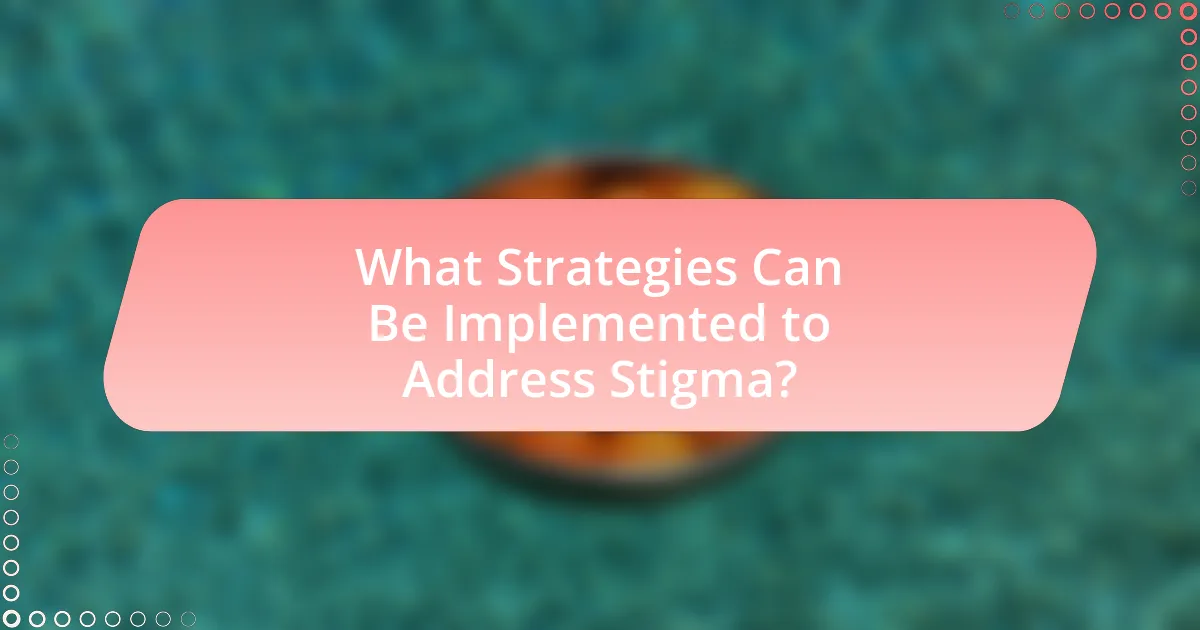
What Strategies Can Be Implemented to Address Stigma?
To address stigma related to eating disorders, strategies such as education, advocacy, and community engagement can be implemented. Education initiatives can inform the public about the realities of eating disorders, dispelling myths and misconceptions; for instance, research shows that informed communities are less likely to hold stigmatizing beliefs (Puhl & Heuer, 2010). Advocacy efforts can promote policy changes that support individuals with eating disorders, such as improved access to treatment and mental health resources. Community engagement, including support groups and awareness campaigns, fosters a supportive environment that encourages open discussions about eating disorders, further reducing stigma. These strategies collectively contribute to a more informed and compassionate society.
How can education help in reducing stigma around eating disorders?
Education can significantly reduce stigma around eating disorders by increasing awareness and understanding of these conditions. When educational programs provide accurate information about the causes, symptoms, and treatment of eating disorders, they help dispel myths and misconceptions that contribute to stigma. For instance, studies show that comprehensive education initiatives can lead to a 30% increase in knowledge about eating disorders among participants, which correlates with a decrease in negative attitudes towards affected individuals. By fostering empathy and promoting open discussions, education empowers communities to support those struggling with eating disorders rather than ostracizing them.
What educational programs are effective in schools and communities?
Educational programs that are effective in schools and communities include comprehensive health education, peer-led support groups, and awareness campaigns focused on mental health and eating disorders. Comprehensive health education programs, such as those implemented by the National Eating Disorders Association, provide students with accurate information about body image, nutrition, and the psychological aspects of eating disorders, leading to increased awareness and reduced stigma. Peer-led support groups, like those organized by the Alliance for Eating Disorders Awareness, foster a safe environment for individuals to share experiences and receive support, which has been shown to improve mental health outcomes. Awareness campaigns, such as National Eating Disorders Awareness Week, engage communities in discussions about eating disorders, promoting understanding and empathy, which are crucial for reducing stigma and encouraging individuals to seek help.
How can healthcare professionals be trained to address stigma?
Healthcare professionals can be trained to address stigma through comprehensive education programs that focus on understanding the impact of stigma on patients with eating disorders. These programs should include training on empathy, communication skills, and the social determinants of health, which are crucial for fostering a supportive environment. Research indicates that stigma can significantly hinder treatment outcomes; for instance, a study published in the Journal of Eating Disorders found that stigma negatively affects help-seeking behavior among individuals with eating disorders. By incorporating evidence-based practices and real-life scenarios into training, healthcare professionals can better recognize and mitigate their biases, ultimately improving patient care and outcomes.
What are some best practices for advocacy in eating disorder awareness?
Best practices for advocacy in eating disorder awareness include promoting accurate information, fostering open conversations, and collaborating with affected individuals and organizations. Accurate information helps dispel myths and stigma surrounding eating disorders, as evidenced by the National Eating Disorders Association, which emphasizes the importance of education in reducing misconceptions. Open conversations create safe spaces for individuals to share their experiences, which can lead to increased understanding and empathy. Collaboration with individuals who have lived experience and organizations dedicated to eating disorder awareness ensures that advocacy efforts are informed and impactful, as highlighted by the success of campaigns like National Eating Disorders Awareness Week, which mobilizes communities to engage in meaningful dialogue and support.
How can collaboration among organizations enhance advocacy efforts?
Collaboration among organizations can significantly enhance advocacy efforts by pooling resources, expertise, and networks to create a unified voice. When multiple organizations work together, they can amplify their message, reach a broader audience, and increase the impact of their campaigns. For instance, a coalition of mental health organizations can share research, coordinate events, and leverage each other’s platforms to raise awareness about eating disorders more effectively. Studies have shown that collaborative advocacy initiatives can lead to increased funding and policy changes, as seen in the National Eating Disorders Association’s partnerships with various health organizations, which have successfully influenced legislation related to mental health funding.
What role does policy change play in addressing stigma?
Policy change plays a crucial role in addressing stigma by creating legal frameworks that promote inclusivity and protect individuals from discrimination. For instance, legislation that mandates mental health education in schools can reduce misconceptions about eating disorders, fostering a more supportive environment. Studies have shown that regions with comprehensive mental health policies experience lower levels of stigma, as these policies encourage open discussions and increase awareness about mental health issues, including eating disorders.
What practical steps can individuals take to support eating disorder awareness?
Individuals can support eating disorder awareness by educating themselves and others about the signs, symptoms, and impacts of these disorders. This education can be achieved through reading reputable sources, attending workshops, or participating in awareness campaigns. Additionally, individuals can share personal stories or testimonials to foster understanding and empathy, as personal narratives can significantly reduce stigma. Volunteering with organizations that focus on eating disorders, such as the National Eating Disorders Association, can also amplify awareness efforts and provide support to those affected. Engaging in social media campaigns that promote body positivity and mental health can further spread awareness and encourage open discussions about eating disorders.
